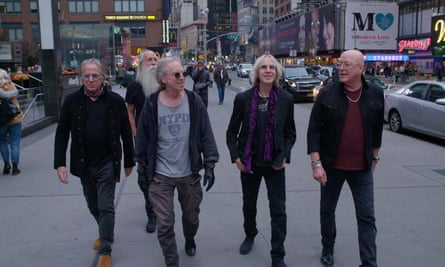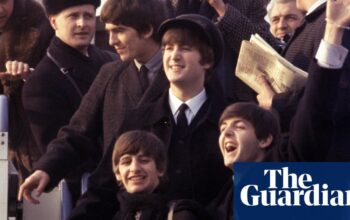A
In the early 1970s, a popular new term emerged in the music world – “the singer-songwriter”. This label was given to a group of rising stars such as James Taylor, Carole King, Joni Mitchell, and Jackson Browne. However, it is worth noting that all of these musicians actually despised the term. According to Danny Kortchmar, a guitarist who worked with these artists, not a single one of them embraced the label.
A recently released film, named Immediate Family, sheds light on the reasons behind this. According to the director of the film, Denny Tedesco, the term “singer-songwriter” often gives the impression of a solo performance, but in reality, it was the complete opposite. The musicians who contributed to the albums of famous artists played a crucial role in their creation, rather than just accompanying them on the tracks.
One listen to the songs they performed confirms this. Could Browne’s “Doctor My Eyes” have the same impact without the catchy bass line created by Leland Sklar? Would Taylor’s “Fire and Rain” have the same emotional pull without the determined drum fills punctuating it from Russ Kunkel? And would King’s “It’s Too Late” have the same effect without the melancholic guitar solo by Kortchmar, a riff that is so well-known that fans can easily hum along?
The narrative behind the solo itself highlights the significant contribution these musicians made. When the studio’s red light signaled that it was time to record “It’s Too Late”, King instructed Kortchmar to play a solo. Her only instruction was to make it good, to which the guitarist jokingly responded, “What you hear on the record is exactly what I did.”
The narratives highlight Immediate Family, a movie named after the nickname for a group of four studio musicians who dominated the music scene in Los Angeles during the 1970s and 1980s. This quartet included bassist Sklar, drummer Kunkel, and guitarists Kortchmar and Waddy Wachtel. Whether individually or in different combinations, they collaborated with all the aforementioned artists, as well as Linda Ronstadt, Warren Zevon, Randy Newman, Neil Young, Stevie Nicks, and many others. They also joined some of these artists’ touring bands and some even went on to write and produce hit songs. During their peak years, they experienced a taste of fame like the main stars. Only in the new film, however, are their complete stories being told.
During the 1960s, Kortchmar spent his summers on Martha’s Vineyard where he met a young Taylor and formed the band the Flying Machine. After their breakup, Taylor signed with the Beatles’ label, Apple, and released his first self-titled album. When Apple collapsed, Taylor returned to the US and recorded his breakthrough album, Sweet Baby James, with Kortchmar on guitar and Kunkel on drums. The same musicians also played on King’s Tapestry album a year later. Sklar joined their circle after playing on Taylor’s album Mud Slide Slim and Wachtel completed the group within a year. However, these musicians might not have gained fame if producers Peter Asher and Lou Adler hadn’t made sure to feature their names prominently on the album covers they played on. This was especially important in the 1970s when fans closely examined album cover art and credits. “On those album covers, these musicians’ names were just as big as the stars’,” Tedesco explained. “And they had unique names like Waddy and Kootch (a nickname for Kortchmar), so they stood out.”
In contrast, the previous generation of highly skilled studio musicians, known as the Wrecking Crew, did not receive credit for their contributions to popular songs in the 1960s. The differences between these musicians and those in the Family, a more recent group of studio players, are evident to director Tedesco. He created a well-regarded documentary in 2008 called The Wrecking Crew, which featured his father, guitarist Tommy Tedesco. In addition to achieving more recognition than the Wrecking Crew, the Family also received better compensation. When asked if he thought he should have been paid more for his work in the 60s, Tedesco’s father would respond, “We played on countless hits, but we also played on countless flops. I never refunded anyone for those sessions.”
The dynamics between the Crew and the Family varied greatly in terms of their personal and professional interactions. The Crew was given specific instructions to follow, while the Family had more creative freedom granted by the stars. According to Wachtel, their role was to interpret the songs in their own unique way, which is why they were hired for the job.
Their age and artistic style aligned, making it easier for them to connect. Additionally, they resided in close proximity and were part of the same social groups. In order to showcase the unique bond among the musicians in the studio, the filmmaker included multiple scenes in the movie where they engage in playful banter. Tedesco explained, “Musicians have a unique way of communicating with one another. Their personal relationships are crucial to the success of their music, not just their skills as performers.”

Wachtel and Kortchmar share a strong bond as co-guitarists. Despite the potential for competition, they developed a close friendship. “We quickly discovered that our unique styles complemented each other, making for great performances,” Kortchmar explained.
Wachtel commented that Danny’s sound is more polished compared to his own. He mentioned having a harsher sound while Danny has a lovely and clear tone. They both do not play on the same spot of the neck.
Both players moved from their birthplace in New York to the LA music scene, and their bold personalities reflect the city’s playful attitude. Wachtel shares a few anecdotes in the documentary that showcase this, including one from the recording of Steve Perry’s hit single “Oh, Sherrie.” Although he was initially hired to play rhythm guitar, Wachtel confidently suggested adding a solo to the song. Despite some hesitation from the producer, Wachtel persisted and proved his idea was the perfect addition to take the song to new heights. Wachtel stands by his belief that it’s important to speak up when you know something is right.
During these moments, the musicians were not only playing a supporting role, but also acting as arrangers. They sometimes even assumed the role of a producer. These skills were especially useful as music evolved in the transition from the 70s to the 80s, with changes in appearance, sound, and technology. As MTV became popular, synthesizers and drum machines emerged, potentially limiting the demand for studio work and making traditional musicians obsolete. However, instead of being phased out, Kortchmar stated that they adapted and found ways to incorporate their playing into any upcoming situation.
Kortchmar began writing and producing music for famous musicians, particularly Don Henley. He wrote the popular song “All She Wants to Do Is Dance” and co-wrote “Dirty Laundry.” At the same time, Wachtel produced and wrote songs for Zevon, including the hit “Werewolves of London,” as well as for various film soundtracks. In the late 1980s, Wachtel joined Keith Richards’ band, the X-Pensive Winos, outside of his main band, the Rolling Stones. The dynamic between the members was just as tight and close as in Richards’ main band. Wachtel explained, “Keith is one of the most amazing rhythm players in the world, so I would play live leads on those tracks. I always knew when to step back and let him shine.”

In the 1970s, three members of the band Family – Kortchmar, Kunkel, and Sklar – had their own musical group called the Section. They released three instrumental fusion-style albums. Prior to this, Sklar had contributed to one of the most influential fusion albums, Spectrum by Billy Cobham. In 2001, all four members, along with singer Steve Postell, collaborated on an album under the name Immediate Family. This same group has recently recorded a new album set to be released early next year. Meanwhile, Wachtel has been on tour with Stevie Nicks, for whom he created the iconic guitar riff in her hit song “Edge of Seventeen.”
Nowadays, the members of the Family band rarely engage in session work. This is due to their other commitments and also because the demand for this type of work has decreased significantly. With advancements in technology, artists can now create records independently using their own computer at home, making the use of expensive studio musicians unnecessary. Kortchmar expressed that the industry has undergone major changes and that many recording studios have shut down. He sympathizes with aspiring session musicians who may struggle to find work in today’s market.
Regarding this, the members of the Family group are especially grateful for the period they spent in the environment which they played a role in shaping. “We were putting in a lot of hard work during that time,” Kortchmar expressed. “It was like paradise.”
Director Tedesco expressed his joy in featuring and documenting their work in his film. He stated, “Each song serves as a memorable milestone in one’s life. It’s crucial to acknowledge the contribution of these individuals in providing us with countless moments to remember.”
-
The movie “Immediate Family” is currently showing in US theaters and will be released digitally on December 15th. A release date for the UK has yet to be announced.
Source: theguardian.com


